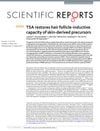Glucose Metabolism Regulates Expression of Hair-Inductive Genes of Dermal Papilla Spheres via Histone Acetylation
March 2020
in “
Scientific reports
”

TLDR Hair growth genes work better with more glucose due to changes in gene-regulating markers.
The study demonstrated that dermal papilla cells (DP), which are essential for hair formation, rely on aerobic glycolysis for their function. When DP were exposed to low glucose levels or glycolysis inhibitors, there was a decrease in the expression of genes known to induce hair growth, and hair shaft elongation was also reduced. Conversely, high glucose levels increased the expression of these hair-inductive genes and enhanced hair shaft elongation. The research further revealed that glycolysis affects histone acetylation, a key epigenetic modification, and that inhibiting acetyltransferase, an enzyme involved in this process, reduced the expression of hair-inductive genes in active DP. These findings suggest that glucose metabolism is critical for the activation of genes that induce hair growth, which could be significant for hair follicle generation in vitro.










